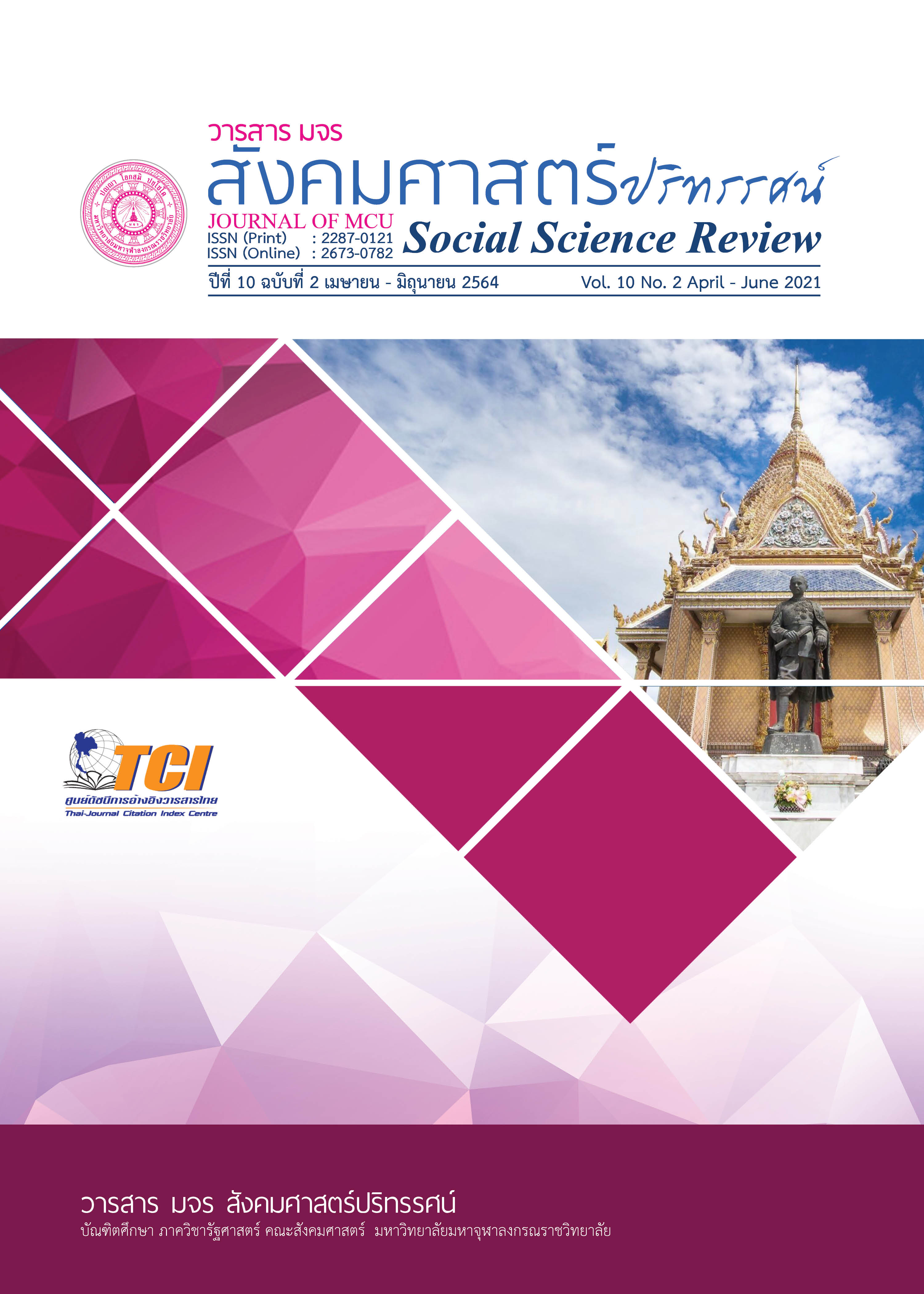รูปแบบการจัดการความรู้ด้านศาสนาสำหรับผู้สูงอายุ ในศตวรรษที่ 21
คำสำคัญ:
รูปแบบ, การจัดการความรู้, ผู้สูงอายุ, ศตวรรษที่ 21บทคัดย่อ
บทความวิจัยนี้มีวัตถุประสงค์เพื่อศึกษาระดับการจัดการความรู้ สภาพปัญหา อุปสรรค ข้อเสนอแนะและนำเสนอรูปแบบการจัดการความรู้ เป็นการวิจัยแบบผสานวิธี ประกอบด้วยการวิจัยเชิงคุณภาพเก็บข้อมูลด้วยการสัมภาษณ์เชิงลึก กับผู้ให้ข้อมูลสำคัญ 18 รูปหรือคน วิเคราะห์ข้อมูลเชิงพรรณนา เรียบเรียงและจำแนกอย่างเป็นระบบ และการวิจัยเชิงปริมาณ เป็นการวิจัยเชิงสำรวจ จากแบบสอบถาม ซึ่งมีค่าความเชื่อมั่นทั้งฉบับเท่ากับ 0.964 กับกลุ่มตัวอย่าง ได้แก่ผู้สูงอายุจังหวัดพระนครศรีอยุธยา จำนวน 399 คน สถิติที่ใช้ในการวิจัย คือ ค่าความถี่ ค่าร้อยละ ค่าเฉลี่ย ค่าเบี่ยงเบนมาตรฐาน
ผลการวิจัยพบว่า 1. ระดับการจัดการความรู้ในภาพรวม พบว่า อยู่ในระดับปานกลาง ( = 3.49, S.D.=0.376) 2. สภาพปัญหา อุปสรรค พบว่า พระสงฆ์บางรูปไม่สามารถเทศน์สอนญาติโยมได้ มักอ่านคัมภีร์เทศน์ ทำให้ไม่น่าสนใจ ข้อเสนอแนะคือ เจ้าอาวาสควรสอนและฝึกอบรมพระภายในวัดเกี่ยวกับหลักการเทศน์สอนญาติโยม จัดให้พระสงฆ์มาบรรยายธรรมให้ญาติโยมฟัง 3. รูปแบบการจัดการความรู้ด้านศาสนาสำหรับผู้สูงอายุ ในศตวรรษที่ 21 ของคณะสงฆ์จังหวัดพระนครศรีอยุธยา พบว่า มี 4 องค์ประกอบ 20 แนวทาง มีพัฒนาศักยภาพของพระภิกษุภายในวัดเกี่ยวกับหลักการเทศน์สอนญาติโยมผู้สูงอายุ เป็นต้น
เอกสารอ้างอิง
กรมกิจการผู้สูงอายุ. (2563). ข้อมูลสถิติผู้สูงอายุประเทศไทย 2562, สืบค้น 3 พฤษภาคม 2563, จาก http://www.dop.go.th/th/know/side/1/1/275
ชนิดาวดี สายืนและอรสา กงตาล. (2557). การจัดการเรียนรู้ตามแนวจิตตปัญญาศึกษาเพื่อสร้างเสริมสุขภาพผู้สูงอายุกลุ่มเสี่ยงเบาหวานในชุมชน. วารสารการพยาบาลและการดูแลสุขภาพ, 32(3), 69-76.
ประสพสุข ฤทธิเดชสมบัติ ฤทธิเดช. (2559). การเรียนรู้รำวงชาวบ้านเพื่อเสริมสร้างสุขภาวะของผู้สูงอายุ. วารสารวิจัยเพื่อพัฒนาสังคมและชุมชน มหาวิทยาลัยราชภัฏมหาสารคาม, 3(2) , 9-18.
มนตรี วิวาห์สุข. (2562). การพัฒนาห้องเรียนแห่งการตื่นรู้. วารสารครุศาสตร์ จุฬาลงกรณ์มหาวิทยาลัย, 47(1), 358-376.
_________. (2563). ความพร้อมและแผนพัฒนาวัดเพื่อรองรับสังคมสูงวัย จังหวัดชลบุรี. วารสารวิชาการมนุษยศาสตร์และสังคมศาสตร์ มหาวิทยาลัยบูรพา, 28(1), 216-243.
สมบูรณ์ ศิริสรรหิรัญ. (2559). แนวทางการจัดตั้งศูนย์การเรียนรู้ชุมชนเพื่อการเรียนรู้ตลอดชีวิตสำหรับผู้สูงอายุ. วารสารการบริหารปกครอง, 5(2), 60-74.
สุธีรา บัวทอง และคณะ. (2558). ผู้สูงอายุกับเหตุผลในการเรียนรู้วิธีการเรียนรู้ และสิ่งที่ต้องการเรียนรู้. วารสารศึกษาศาสตร์ มหาวิทยาลัยศิลปากร, 12(1), 6 – 17.
อาชัญญา รัตนอุบลและคณะ. (2555). การพัฒนาแนวทางการส่งเสริมการจัดการศึกษาการเรียนรู้เพื่อการ พัฒนาศักยภาพผู้สูงอายุ. วารสารครุศาสตร์, 40(3), 14-28.
ดาวน์โหลด
เผยแพร่แล้ว
รูปแบบการอ้างอิง
ฉบับ
ประเภทบทความ
สัญญาอนุญาต
ลิขสิทธิ์ (c) 2021 วารสาร มจร สังคมศาสตร์ปริทรรศน์

อนุญาตภายใต้เงื่อนไข Creative Commons Attribution-NonCommercial-NoDerivatives 4.0 International License.
เพื่อให้เป็นไปตามกฎหมายลิขสิทธิ์ ผู้นิพนธ์ทุกท่านต้องลงลายมือชื่อในแบบฟอร์มใบมอบลิขสิทธิ์บทความให้แก่วารสารฯ พร้อมกับบทความต้นฉบับที่ได้แก้ไขครั้งสุดท้าย นอกจากนี้ ผู้นิพนธ์ทุกท่านต้องยืนยันว่าบทความต้นฉบับที่ส่งมาตีพิมพ์นั้น ได้ส่งมาตีพิมพ์เฉพาะในวารสาร มจร สังคมศาสตร์ปริทรรศน์ เพียงแห่งเดียวเท่านั้น หากมีการใช้ภาพหรือตารางหรือเนื้อหาอื่นๆ ของผู้นิพนธ์อื่นที่ปรากฏในสิ่งตีพิมพ์อื่นมาแล้ว ผู้นิพนธ์ต้องขออนุญาตเจ้าของลิขสิทธิ์ก่อน พร้อมทั้งแสดงหนังสือที่ได้รับการยินยอมต่อบรรณาธิการ ก่อนที่บทความจะได้รับการตีพิมพ์ หากไม่เป็นไปตามข้อกำหนดเบื้องต้น ทางวารสารจะถอดบทความของท่านออกโดยไม่มีข้อยกเว้นใดๆ ทั้งสิ้น





